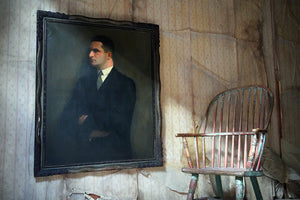SOLD
Origin: English
Period: George III/Regency
Provenance: Unknown
Date: c.1810-20
Height: 28.25”
Diameter: 15”
The walnut wine or candle stand type table of exceptional colour, having a well-turned stem, pie crust top and a draught turned base to concealed peg feet, the whole surviving from the first quarter of the nineteenth century.
The table is structurally sound and stable, with a beautiful faded patina and has no issues to note. The top is slightly wonky but that is part of the charm. There is sporadic very old traces of worm.
Unlike many wine tables of this period the base here is circular and not with the much more common tripod legs which makes it closer to Quaker type pieces of the period.
These types of communities were largely self-sufficient: in their attempt to separate themselves from the outside world and to create a heaven-on-earth, members grew their own food, constructed their own buildings, and manufactured their own tools and household furnishings.
The guiding principles of honesty, utility, and simplicity found expression in various crafts: furniture, boxes, and textiles made by the Quakers are renowned for their minimalist design and unstinting quality. Rejecting excessive ornament because it ostensibly encouraged the sin of pride, this type of furniture focused on overall form and proportion.
A more charming table you could not wish to find.
Period: George III/Regency
Provenance: Unknown
Date: c.1810-20
Height: 28.25”
Diameter: 15”
The walnut wine or candle stand type table of exceptional colour, having a well-turned stem, pie crust top and a draught turned base to concealed peg feet, the whole surviving from the first quarter of the nineteenth century.
The table is structurally sound and stable, with a beautiful faded patina and has no issues to note. The top is slightly wonky but that is part of the charm. There is sporadic very old traces of worm.
Unlike many wine tables of this period the base here is circular and not with the much more common tripod legs which makes it closer to Quaker type pieces of the period.
These types of communities were largely self-sufficient: in their attempt to separate themselves from the outside world and to create a heaven-on-earth, members grew their own food, constructed their own buildings, and manufactured their own tools and household furnishings.
The guiding principles of honesty, utility, and simplicity found expression in various crafts: furniture, boxes, and textiles made by the Quakers are renowned for their minimalist design and unstinting quality. Rejecting excessive ornament because it ostensibly encouraged the sin of pride, this type of furniture focused on overall form and proportion.
A more charming table you could not wish to find.


























